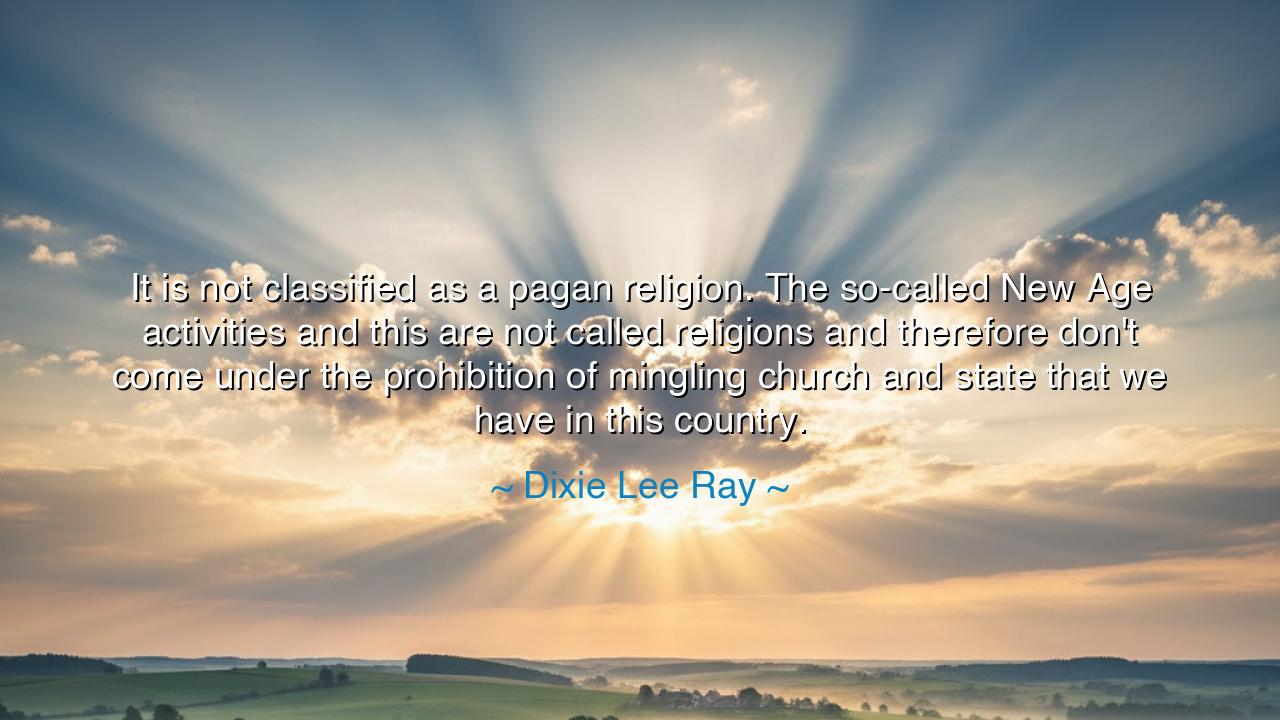
It is not classified as a pagan religion. The so-called New Age
It is not classified as a pagan religion. The so-called New Age activities and this are not called religions and therefore don't come under the prohibition of mingling church and state that we have in this country.






The words of Dixie Lee Ray—“It is not classified as a pagan religion. The so-called New Age activities and this are not called religions and therefore don't come under the prohibition of mingling church and state that we have in this country.”—echo like a judgment uttered in an age of confusion. They speak not of worship in temples or hymns sung at dawn, but of the unseen boundaries between faith and governance, between belief and law, between the soul’s freedom and the state’s dominion. In her statement lies a warning both subtle and profound: that what a society refuses to name, it cannot properly guard against. When beliefs without names begin to shape the hearts of men, they may rise quietly into power, influencing nations as surely as any king or priest of old.
In the time of Dixie Lee Ray, a scientist, governor, and thinker of fierce independence, the world was shifting. The old gods of tradition were being questioned; the new gods were cloaked in the language of progress and self-discovery. The New Age movements—meditations, crystals, cosmic energies, and whispers of enlightenment—claimed no temple, yet demanded reverence. They were not “religions,” at least not by law. Thus, they passed unseen beneath the watchful eye of the Constitution’s barrier between church and state. What Ray discerned, and what many failed to see, was that the soul of a people can be reshaped not only by decrees and doctrines, but by the quiet drift of new beliefs disguised as culture, psychology, or science.
The ancients knew well the danger of unacknowledged faiths. In the days of Rome, when the empire’s heart began to crumble, it was not armies alone that weakened it, but the erosion of belief. The Romans worshiped many gods, but in time they began to worship themselves—their own reason, their own grandeur, their own empire. That self-worship, unspoken and unnamed, became a new religion without temples, and it hollowed their strength. In this, the words of Ray find ancient resonance: for when a people no longer recognizes the forces that guide their convictions, those forces may lead them into shadow.
Her warning was not against spirituality, but against deception through ambiguity. When men and women embrace beliefs that are treated as non-religious, they can enter public life, education, and governance unchallenged, carrying with them moral codes and cosmic visions that shape decisions for millions. The danger lies not in the presence of belief—every society must believe in something—but in the failure to name what those beliefs are. Just as poisons may enter the body when one drinks too trustingly, so may unseen ideologies enter the spirit of a nation when disguised as harmless philosophies.
Consider the tale of Socrates, who stood before the tribunal of Athens accused of corrupting the youth and introducing new gods. His accusers feared his ideas more than his actions, for ideas have a way of becoming invisible rulers. Socrates’ trial was not merely about blasphemy—it was about the power of belief disguised as reason. So too, in our modern age, the New Age philosophies, secular movements, and scientific mysticisms often carry moral fervor without divine names. Ray’s insight pierces this veil: that when we cease to call such systems “religions,” they may still claim the loyalty of souls while evading the laws that guard against tyranny of faith.
Yet there is wisdom and compassion in her words as well. For Ray does not demand the suppression of thought or the silencing of seekers. Rather, she reminds us of accountability—that we must name what we worship, even if that altar is within ourselves. To pretend that something is not a belief when it guides our choices is to lie to our own conscience. Whether one bows before a cross, a crystal, or the mirror of human intellect, all are acts of reverence. The difference lies only in honesty.
Thus, let the lesson be this: truth requires naming. When you encounter new ideas that promise light, do not drink without asking their source. When a philosophy enters your heart, question what it worships. In every generation, new movements will rise—some holy, some hollow—but it is the duty of the wise to discern, to speak plainly, and to guard the sacred boundary between conviction and control. Do not fear new thought, but demand of it clarity. For only when belief stands in the open sunlight can freedom endure.
So, my listener, as you walk through the labyrinth of modern life—filled with its gurus, systems, and subtle gods—remember the counsel of Dixie Lee Ray: not every unseen religion is harmless, and not every unlabeled faith is free. Name what you believe. Examine what you follow. And never let the state of your soul be governed by powers you refuse to recognize.






AAdministratorAdministrator
Welcome, honored guests. Please leave a comment, we will respond soon